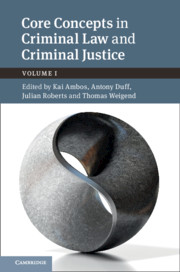Book contents
- Core Concepts in Criminal Law and Criminal Justice
- Core Concepts in Criminal Law and Criminal Justice
- Copyright page
- Contents
- Preface
- Abbreviations
- Contributors
- Part I Introduction
- Part II Criminal Law
- 2 Omissions
- 3 Preparatory Offences
- 4 Participation in Crime
- 5 Consent in the Law Relating to Sexual Offences
- 6 Terrorism Offences
- Part III Criminal Justice and Procedure
- Index
- References
6 - Terrorism Offences
from Part II - Criminal Law
Published online by Cambridge University Press: 19 December 2019
- Core Concepts in Criminal Law and Criminal Justice
- Core Concepts in Criminal Law and Criminal Justice
- Copyright page
- Contents
- Preface
- Abbreviations
- Contributors
- Part I Introduction
- Part II Criminal Law
- 2 Omissions
- 3 Preparatory Offences
- 4 Participation in Crime
- 5 Consent in the Law Relating to Sexual Offences
- 6 Terrorism Offences
- Part III Criminal Justice and Procedure
- Index
- References
Summary
How should the criminal law respond to the threat of terrorism? One possible answer is that no special response is needed. Legal systems around the world already criminalise such acts as killing, maiming and causing explosions, as well as attempting, inciting or conspiring to do any of these things. Another possible answer is that the criminal law has a role to play in pre-empting terrorist attacks. Since these attacks can cause such severe and extensive harm, the criminal law is justified in intervening at an earlier stage than usual, in order to ensure that they are not carried out. This second answer has recently proved the more popular among legislators in many jurisdictions, including Germany and the UK.
- Type
- Chapter
- Information
- Core Concepts in Criminal Law and Criminal Justice , pp. 172 - 210Publisher: Cambridge University PressPrint publication year: 2020

